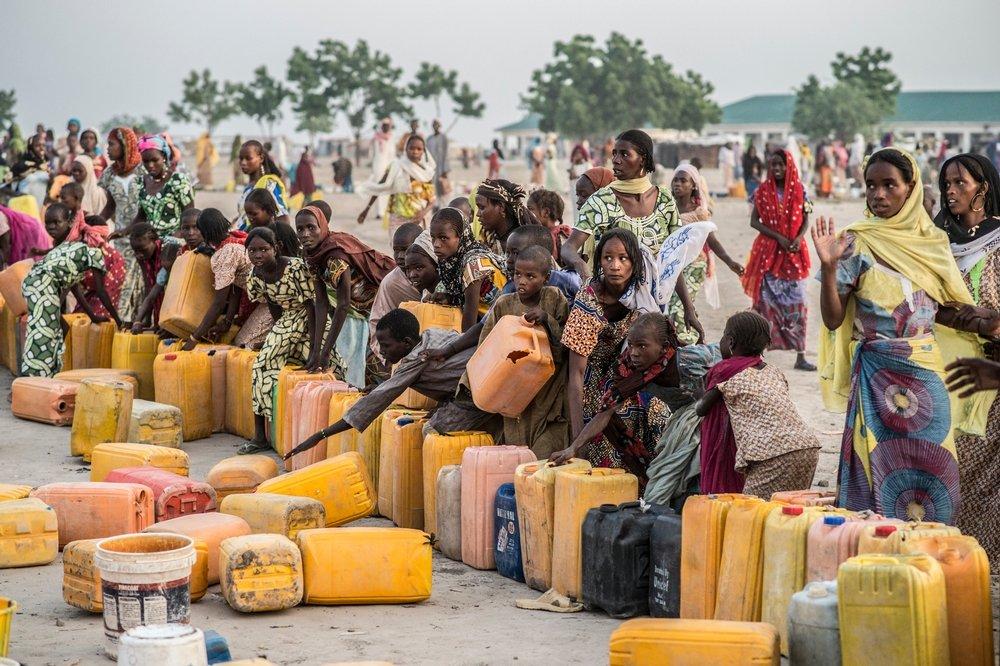In Maiduguri, MSF teams are treating malnourished children in a therapeutic feeding center in Gwange with more than 100 beds. More than 300 children are admitted per month. The teams also run two health centers in Maimusari and Bolori with more than 3.000 consultations per week.
Ambulatory feeding centers and maternity services are part of the centers, as well as a pediatric clinic with 50 beds in Maimusari. MSF regularly distributes food and aid in four camps for displaced persons, among them Muna Garage camp, and offers medical care. Eight women in the health centres share their stories.
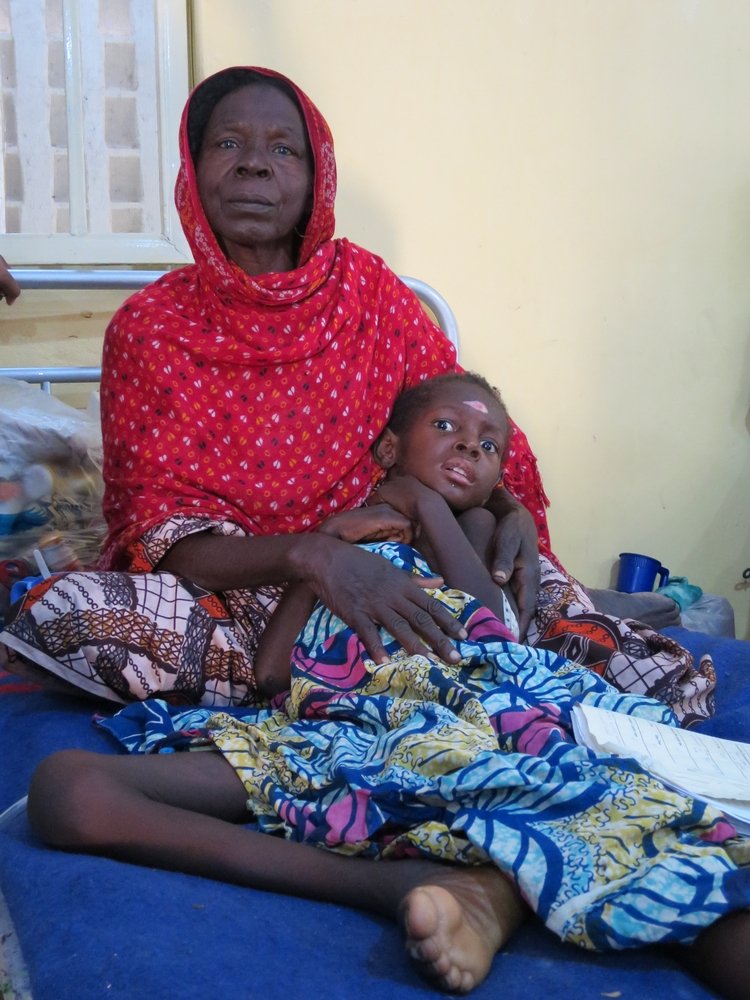
Zainab Ali
"I am 60 years old from Alkaleri in Mafa. I have been in this hospital since 18 days when my granddaughter was admitted. She had convulsions, diarrhea, headache and she vomited a lot also. Her name is Aisha, she is eight years old. When we brought her here, she was unconscious and could not eat. But now she is getting better and can eat. She started eating yesterday.
Her mother, who is my daughter, is outside. She has a little baby she needs to look after while I attend to Aisha.
We live at Muna Garage IDPs camp and have been there for two years since arriving from Alkaleri, a village not far from Maiduguri and we trekked for three hours to get to Muna.
My husband died from illness five years ago and I have seven children. We all live in Muna in makeshift shelters which we built with sacks and sticks. My daughter lives with her husband and the little baby in one shelter. Aisha and I live in another while my other children have their own too.
Our major problem at Muna is food and shelter. My son-in-law, Aisha's father, sells coconuts to buy corn and millet for us to eat.
This is not enough but we have no choice. We do not farm but we are allowed to go out of the camp. The security men at the entrance to the camp search and question us. If they see you with anything, even a cup, they want to know what is inside and where you got it from."
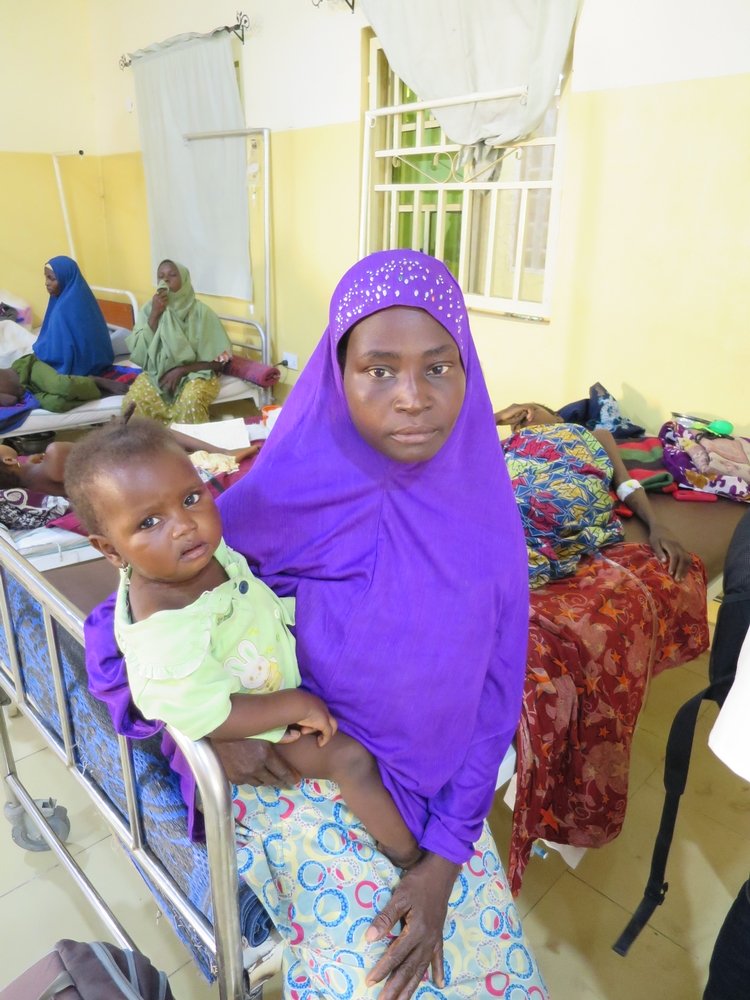
Bintu Bashir
"I am 30 years old from Gamboru, but I live here in Maiduguri in the neighborhood around the customs office. I had eight children but only five are alive. I brought here my 16 years old daughter, Fatima, who has the sickle cell anaemia. She's had this sickness since she was five months old.
The sickness usually happens unexpectedly and suddenly. This is the second time in two months that we are bringing her here. She is better now, it is just the pains in her legs that is keeping us here.
I heard about this place in my neighbourhood and the first time we came I was satisfied with the treatment and that was why we came back.
Our biggest problem is lack of food and sometimes we go for days without food. My husband is a bricklayer but for two years he has not been getting jobs. Daily he goes out but mostly comes back empty-handed. Most times also, we depend on neighbours and well-wishers for food. When they give us food, we eat. Otherwise, we stay hungry.
My children used to be sent home from school because of school fees and we would go to the school to plead with the authorities. They saw our situation and knew that we had no money, so now they let them be."
Fatima Mohammed
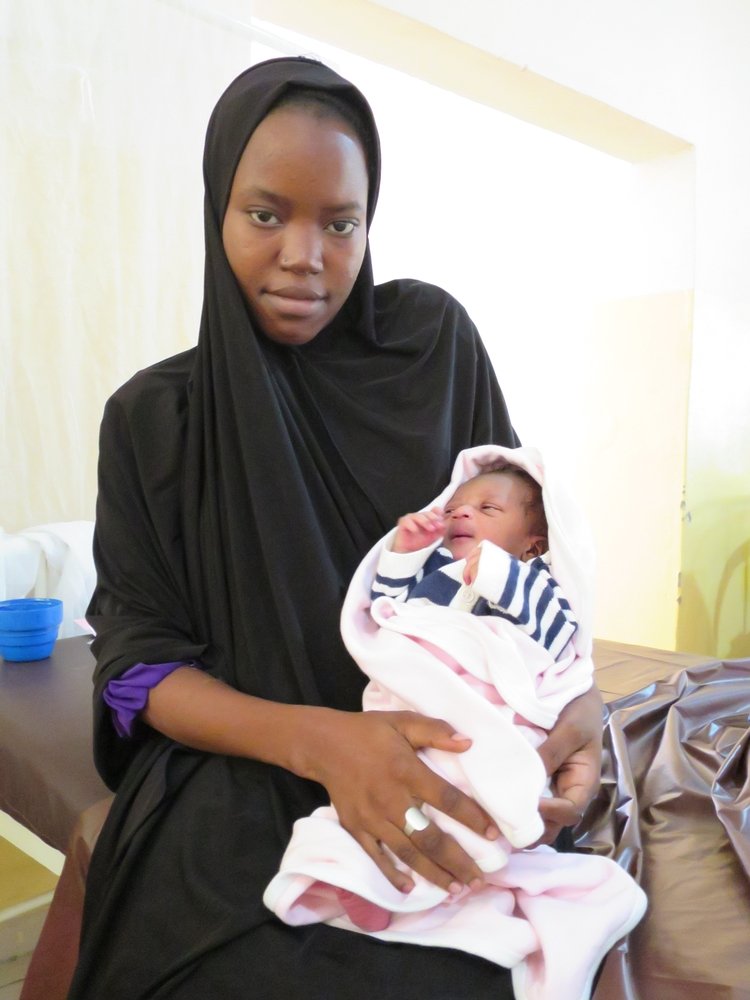
"This is my first child! My son does not have a name yet, he has just been born yesterday at two minutes to twelve. His weight was 2.7 kg. Fortunately, my delivery went well, without complications, but it was painful.
My son will get his name at the naming ceremony one week after his birth. My family and the family of my husband will come together, and we will celebrate.
I live with my husband in a house in Gwange in Maiduguri. We are not happy about the high prices, but we get along. My husband is a welder, and he earns some money.
I have come to the MSF maternity hospital because many women come here and say that they are treated well. People always talk in the town about such things.
It feels good to be a mother. I´d like to have more children, perhaps ten (laughs). For my son, I wish he will go to school and become a doctor. I admire their work."
Hauwa Ibrahim
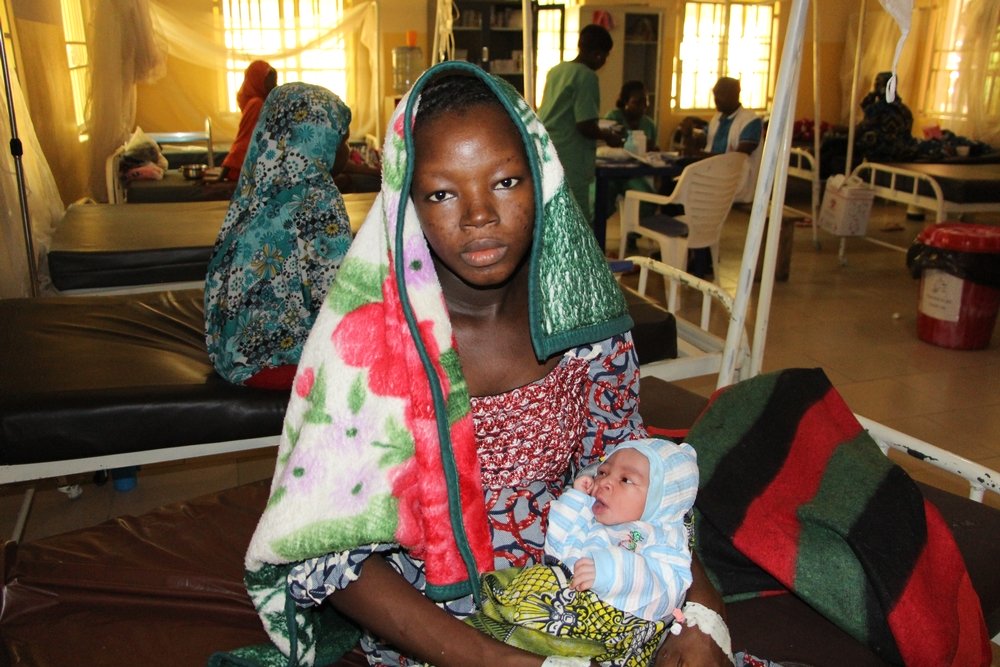
"I'm 20 years old and a displaced person from around Gwoza. I came to Maiduguri with my husband one month ago and we were escorted here by soldiers.
My first child died, so this is my only child now and I gave birth to her today.
We live in the Ngomari in Maiduguri in a rented apartment and my husband deals in yam. Presently we don't have challenges of food but as a wife, I don't have money to buy clothes or do small business. My parents and other family members are here in Maiduguri, too.
I heard about this place in my area, that there is a place where IDPs are treated for free, so I decided to come and deliver here because I have no money to pay in another hospital. Fortunately, I was not asked to pay anything since I arrived."
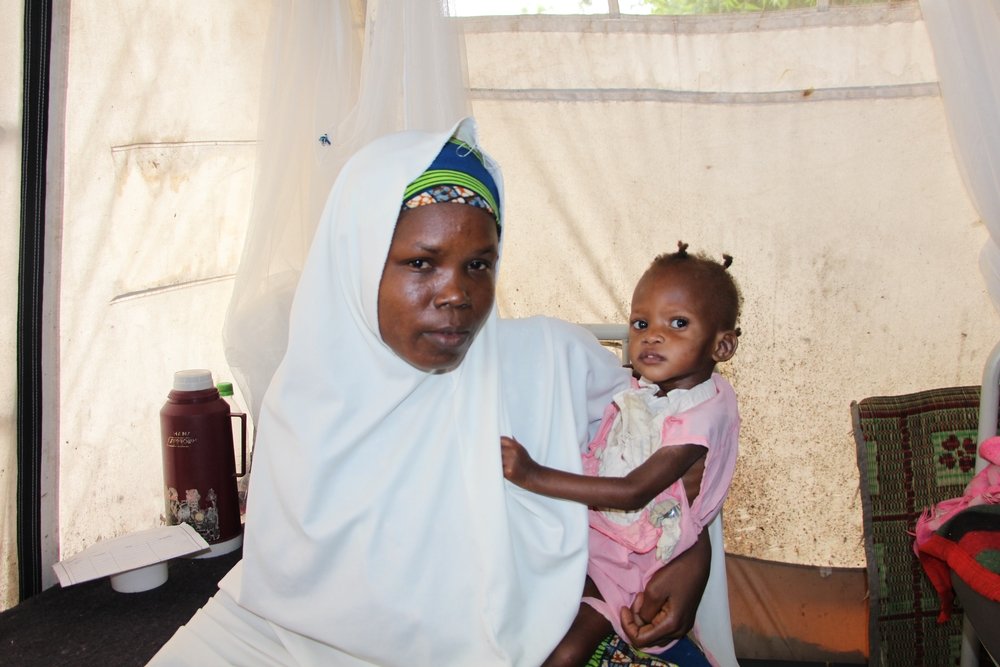
Maryam Dahiru
"I am 35 years old and live in the Jiddari neighborhood in Maiduguri. I first brought my one-year-old daughter, Falmata Umar, to this hospital where we were admitted for two weeks before we were discharged.
She could not eat. She neither sucked my breast nor ate food and this affected her seriously. We had to take her to the General Hospital but were told there was no bed.
People told me to bring her here that there were foreign doctors treating people for free so we brought her here, but she was unconscious. I didn't think she would survive - but look at her now! I think she is strong enough to get married (laughs).
A week after we left here, I am back, but this time it is my son, Mohammed Umar, seven, who is sick. We came yesterday when he got worse and he also had fever but he is now stable and able to eat."
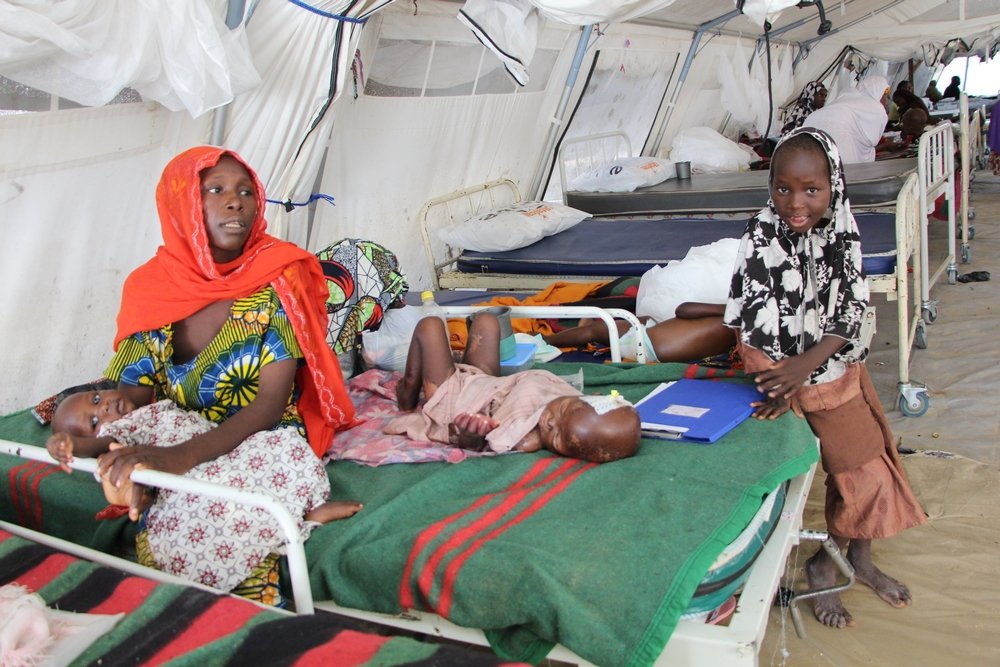
Laraba Mustapha
"I'm from the town of Konduga and I'm 30 years old. I brought my son, three-year-old Bukar Mustapha, who is very sick. We came here 16 days ago but he has been sick for three months.
I have no money to take him to the hospital and did not know about this place, that was why for three months I was giving him traditional medicine.
I heard people talking about one hospital where people receive free treatment – the MSF health facility in Bolori – so I went there with him and they referred us here. He has oedema, cough and diarrhea.
Boko Haram invaded our village and asked us to either join them or leave the town. We chose to leave and moved to Bale, a village on the outskirts of Maiduguri, two years ago. Last year, my husband was killed. My elder sister's son was also killed and my brother-in-law.
My parents are here, too, in Maiduguri, but 20 of my relatives, mostly my mother's siblings, are missing for two years now.
I have three children and we now live near Dala Bus Stop in mud houses. Everyday we go out with my children to beg. It is now very difficult to survive because I hardly make 100 naira in a day, far less than one dollar.
My major challenge is hunger and we sometimes go to bed hungry.
I don't know if I want to go back to Konduga, but that also depends on my mother. If she wants to go back, we will go, but if she doesn´t , we will stay in Maiduguri."
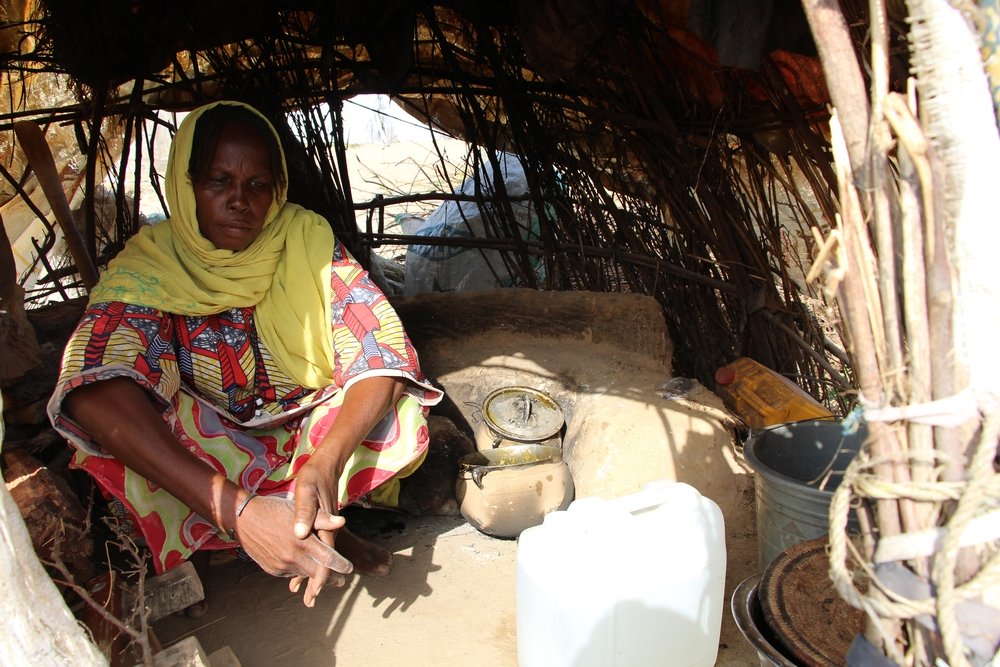
Marne Idrissa
"I am here with my husband and one child. I have two children but one is married. We have been in this camp for almost one year now after we were forced to flee from our village. We trekked for days to get to Maiduguri. Our major problem here is food.
The only food we eat is sorghum because that is the only food we can afford with whatever little money we can find. Since we came, we only got food twice from the Red Cross. They gave us rice, oil and beans, but we have eaten them long ago and we are now starving.
We came here with 10 cows but we have sold them all and used the money to buy food. Right now, we have nothing left to eat beside this little sorghum you are seeing. When it finishes, we have to pray for miracle like we have been doing for a long time."
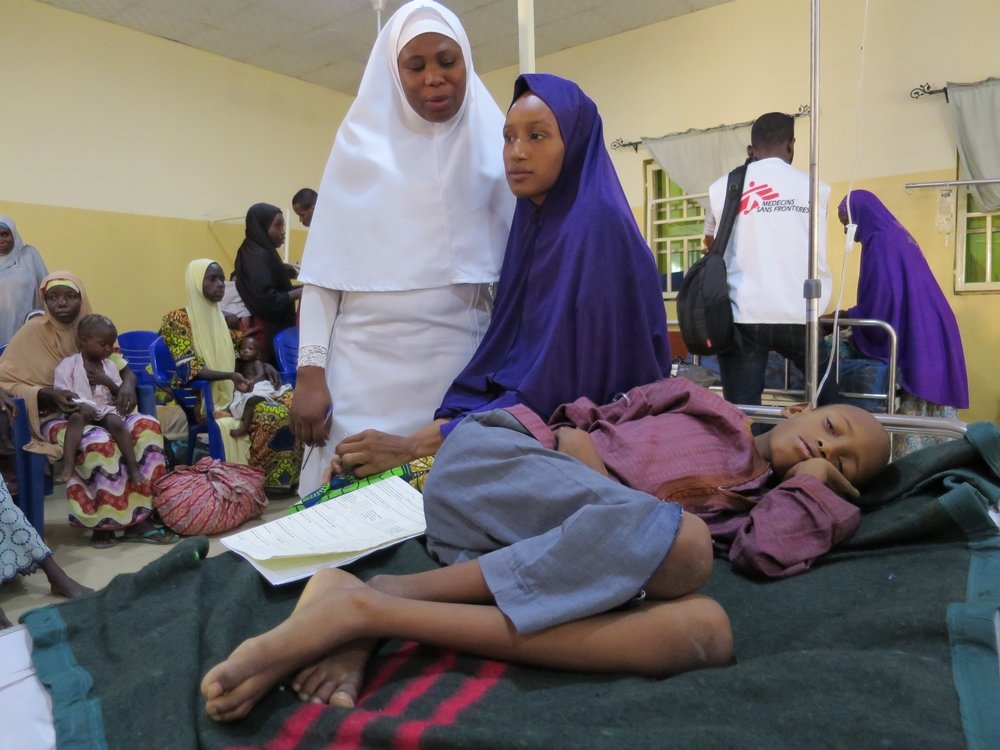
Sara Kawu
"I come from Dikwa, but I had to flee from there with my family due to the fighting.
Now I live with my husband and our five children in a house in Ruwan Zefi, a neighbourhood in Maiduguri at the road to Dikwa. Alhaji is my second child. He has been very sick.
When he eats, he vomits, he had convulsions and blood in his stool.
So I came with him to the hospital yesterday. The doctors gave him fluids and medicine. He´s already better. Since we are here, he has not had convulsions anymore, and he has no complaints.
Life is difficult for us displaced people. Food is expensive, and we spend nights without having eaten. Sometimes we can only eat once a day. My husband used to have a shop. But now he doesn´t have a job.
We have no source of income. Also, I would like to work and do business, but I don´t have the means. I also want to send all my children to school. Only two of them have a place there.
I appreciate very much the care that the MSF doctors do to us. They give us food and blankets and take care of us."
Find out more about MSF's work in Nigeria.
